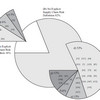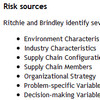An empirical analysis of supply chain risk management in the German automotive industry shows that the group using reactive supply chain risk management seems to do better in terms of disruptions resilience or the reduction of the bullwhip effect, whereas the group pursuing preventive supply chain risk management seems to do better as to flexibility or safety stocks.
husdal.com
- ARTICLES and PAPERS
- BOOKS and BOOK CHAPTERS
- REPORTS and WHITEPAPERS
- LITERATURE Reviews A-Z
- Literature Review – A
- Literature Review – B
- Literature Review – C
- Literature Review – D
- Literature Review – E
- Literature Review – F
- Literature Review – G
- Literature Review – H
- Literature Review – I
- Literature Review – J
- Literature Review – K
- Literature Review – L
- Literature Review – M
- Literature Review – N
- Literature Review – O
- Literature Review – P
- Literature Review – Q
- Literature Review – R
- Literature Review – S
- Literature Review – T
- Literature Review – U
- Literature Review – V
- Literature Review – W
- Literature Review – X
- Literature Review – Y
- Literature Review – Z
- EVERYTHING else












